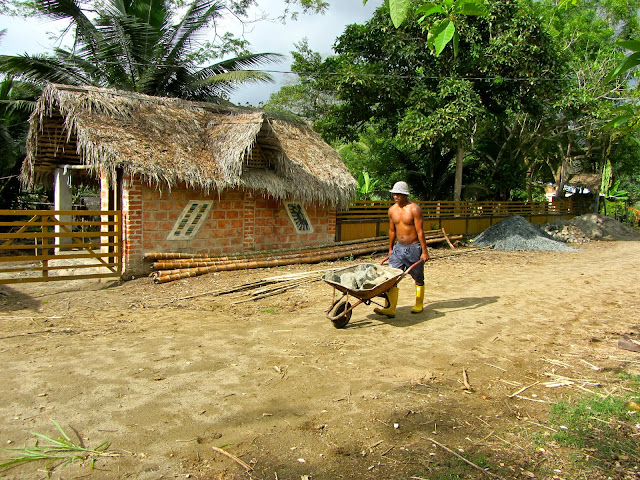Tucked between a few rolling hills on the coast of Ecuador, 14 kilometers from a small, two-street surf town, lies Rio Muchacho Organic Farm.
After a ride in an open-air bus, a bouncy truck bed, the back of a dirt bike, or on an old horse… you will eventually arrive at the gate of the farm, my home for the next seven months.
Spread across these 10 hectares of land is not only my home but the home for numerous herbs and vegetables, various animals, Ecuadorian workers and volunteers from around the world.
I’m here to work for Rio Muchacho as a marketing intern to promote the farm and other ecotourism opportunities through websites, blogs and social media. Since most of my work requires internet, which is not available on the farm, I spend about three days a week in a nearby town and the rest of my time working with the animals and in the garden.
While studying journalism in college, I never imagined I would be waking up every morning to shovel poop in peg pens, but this lifestyle seems to work out.
Days here start early at 6:30 a.m. for morning chores with the animals. Each animal (cows, pigs, chickens, guinea pigs, horses, dogs, a rabbit, a goat and a boar) serves a particular role to keep the farm running. And most of these roles involve poop.
Rio Muchacho is a self-sustaining, organic, pescatarian (we eat fish!) farm. We grow the majority of our food and use organic resources to build and survive. While the goal of the farm is to be sustainable, it also strives to educate people within the community as well as across the world with ideas of how an individual can avoid negatively impacting the environment.
So we begin each day shoveling poop. The food we eat comes from the garden. We feed all scraps and leftovers to the pigs. The pigs digest the food and we scoop their poop to mix with sawdust and excrements from other animals for compost. The compost eventually gets used to fertilize the soil in the garden where the process starts all over again.
The way we live works in circles. Everything we take from the Earth eventually gets returned.


After a ride in an open-air bus, a bouncy truck bed, the back of a dirt bike, or on an old horse… you will eventually arrive at the gate of the farm, my home for the next seven months.
Spread across these 10 hectares of land is not only my home but the home for numerous herbs and vegetables, various animals, Ecuadorian workers and volunteers from around the world.
I’m here to work for Rio Muchacho as a marketing intern to promote the farm and other ecotourism opportunities through websites, blogs and social media. Since most of my work requires internet, which is not available on the farm, I spend about three days a week in a nearby town and the rest of my time working with the animals and in the garden.
While studying journalism in college, I never imagined I would be waking up every morning to shovel poop in peg pens, but this lifestyle seems to work out.
Days here start early at 6:30 a.m. for morning chores with the animals. Each animal (cows, pigs, chickens, guinea pigs, horses, dogs, a rabbit, a goat and a boar) serves a particular role to keep the farm running. And most of these roles involve poop.
Rio Muchacho is a self-sustaining, organic, pescatarian (we eat fish!) farm. We grow the majority of our food and use organic resources to build and survive. While the goal of the farm is to be sustainable, it also strives to educate people within the community as well as across the world with ideas of how an individual can avoid negatively impacting the environment.
So we begin each day shoveling poop. The food we eat comes from the garden. We feed all scraps and leftovers to the pigs. The pigs digest the food and we scoop their poop to mix with sawdust and excrements from other animals for compost. The compost eventually gets used to fertilize the soil in the garden where the process starts all over again.
The way we live works in circles. Everything we take from the Earth eventually gets returned.
"El dinero no se puede comer" or... "You can't eat money"













